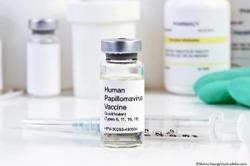© 2025 MJH Life Sciences™ , Patient Care Online – Primary Care News and Clinical Resources. All rights reserved.
Merck's 21-Valent Pneumococcal Vaccine Shows Positive Immune Response in At-Risk Children, Adolescents
Merck's CAPVAXIVE could cover approximately 78% of invasive pneumococcal disease cases in youth with chronic health conditions, vs other approved pneumococcal conjugate vaccines.
Merck announced positive results from the phase 3 STRIDE-13 trial evaluating pneumococcal 21-valent conjugate vaccine (Capaxvie) in children and adolescents at increased risk of pneumococcal disease. Findings were presented September 11, 2025, at the 6th European Society of Clinical Microbiology and Infectious Diseases (ESCMID) Conference on Vaccines in Lisbon, Portugal.1
STRIDE-13 was a randomized, double-blind, active comparator-controlled trial enrolling 882 participants aged 2 to younger than 18 years who had completed a primary pediatric pneumococcal vaccination series and had chronic medical conditions associated with increased pneumococcal disease risk (eg, diabetes, chronic heart, lung, liver, or kidney disease). Participants were randomized 3:2 to receive Capvaxive or PPSV23.1
The study’s primary endpoints included immunogenicity assessed by serotype-specific opsonophagocytic activity (OPA) geometric mean titers (GMTs) 30 days after vaccination and safety as measured by adverse event rates.1
Capvaxive elicited immune responses to all 21 serotypes included in the vaccine. It was noninferior to PPSV23 for the 12 shared serotypes and superior for the 9 unique serotypes, as measured by OPA GMTs at day 30.1
Safety results showed systemic and serious vaccine-related adverse events were comparable between capvaxive and PPSV23. Solicited injection-site reactions were more common with capvaxive (72.3%) compared with PPSV23 (58.2%).1
Capvaxive is currently approved in the US, European Union, Japan, and other countries for prevention of invasive pneumococcal disease and pneumonia in adults aged 50 years and older and those aged older than 18 years with certain chronic medical conditions.2 According to national CDC data (2019–2023), capvaxive could cover approximately 78% of invasive pneumococcal disease cases in children and adolescents with risk conditions, with 11 unique serotypes that account for approximately 34% of IPD cases in this population, Merck said.1
“While CAPVAXIVE was designed to specifically cover the serotypes that cause the majority of invasive pneumococcal disease (IPD) cases in adults, findings from STRIDE-13 underscore its added potential to help protect children and adolescents who are at an increased risk,” Paula Annunziato, senior vice president, infectious diseases and vaccines, global clinical developement, Merck Research Laboratories, said in a statement.1 “We are encouraged by the safety and immunogenicity data presented at the 6th ESCMID Conference on Vaccines, which underpin our commitment to ensuring infants and adults have access to protection against invasive pneumococcal disease.”
Rotem Lapidot, MD, chief of pediatric infectious diseases at Rambam Health Care Campus and STRIDE-13 investigator, said that “offering additional protection to children and adolescents with chronic conditions is essential,” emphasizing the potential benefit of the broader serotype coverage.1
Merck noted that results from STRIDE-13 will be shared with global regulatory authorities as part of its ongoing STRIDE clinical program. Capvaxive was designed to address serotypes responsible for the majority of invasive pneumococcal disease cases in adults but may extend protection to vulnerable pediatric populations.1
Capvaxive should not be administered to individuals with a history of severe allergic reaction to any vaccine component or diphtheria toxoid. Common adverse reactions in adults include injection-site pain, fatigue, headache, and myalgia. Vaccine recipients may not be protected against all serotypes, according to the press release.1
References:
1. CAPVAXIVE® (Pneumococcal 21-valent Conjugate Vaccine) Demonstrates Positive Immune Responses in Children and Adolescents at Increased Risk of Pneumococcal Disease. News release. Merck. September 11, 2025. Accessed September 11, 2025. https://www.merck.com/news/capvaxive-pneumococcal-21-valent-conjugate-vaccine-demonstrates-positive-immune-responses-in-children-and-adolescents-at-increased-risk-of-pneumococcal-disease/
2. Halsey G. FDA Approves Merck's 21-Valent Pneumococcal Vaccine for Adults 50 Years of Age and Older: A First and Long-Awaited. Patient Care. June 18, 2024. https://www.patientcareonline.com/view/fda-approves-merck-s-21-valent-pneumococcal-vaccine-for-adults-50-years-of-age-and-older-a-first-and-long-awaited
Related Content:



